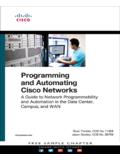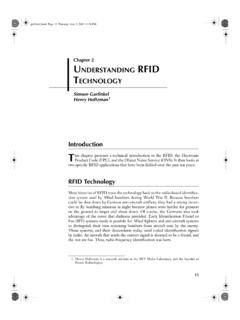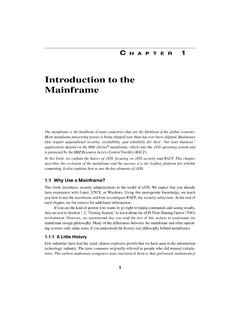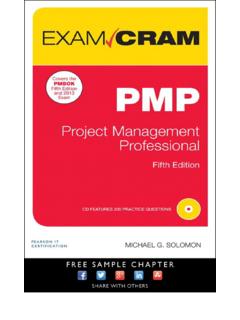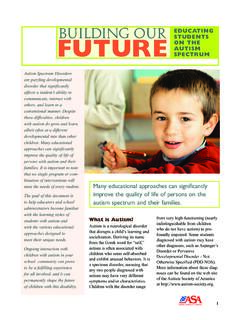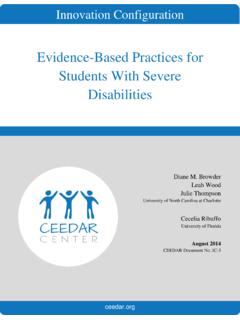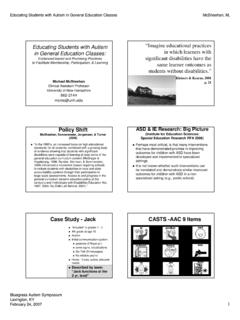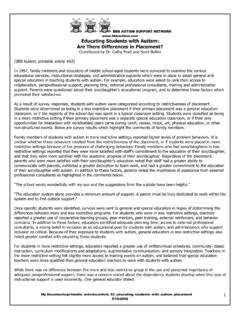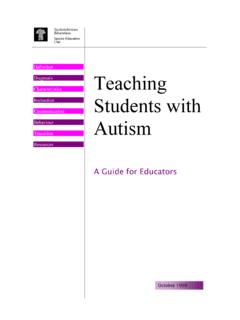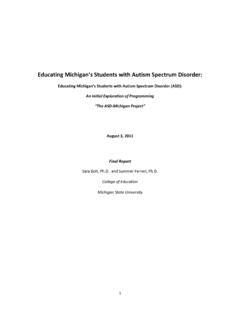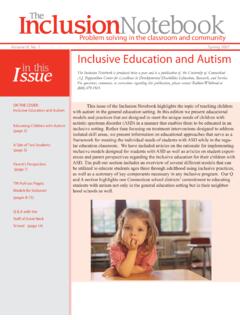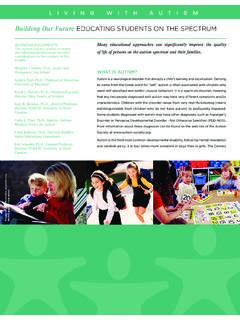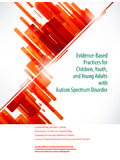Transcription of chapter 1 The Foundation for Educating Students with ...
1 Chapter1 The Foundation forEducating Students with Special NeedsLEARNING ObjectivesAfter you read this chapter , you will beable to1. Explain key terms and conceptsthat describe special Trace the historical events thathave shaped contemporary specialeducation Outline the laws that govern cur-rent practices for Educating stu-dents with Analyze your beliefs related to in-clusive practices, taking into ac-count contemporary knowledgeand expectations about effectiveinstruction and educational ac-cess.
2 As well as parent Describe the categories of disabilitiesaddressed in federal Explain special needs other thandisability that your Students one of those Students who makes his pres-ence known very quickly. He announced on the first dayin his seventh-grade social studies class that the color ofthe walls was xantho(yellow). For several days later thatfall, he came to school wearing only socks on his feet,because, as his mother explained, he had completelyoutgrown his old shoes but would not wear new, better-fitting ones because he said they had knots in thetoes.
3 In all his classes, Thomas tends to keep to him-self, and when group projects are assigned, he has dif-ficulty knowing how to talk to his classmates aboutanything except the subjects he enjoys French wordscommonly used in the English language and AlfredHitchcock movies. When Thomas began elementaryschool, he was enrolled in a special education class forstudents with autism . However, most of his classmateshad significant intellectual disabilities, and the teacherand Thomas s parents quickly realized that he neededto be challenged academically in a way that could nothappen in that class.
4 Since second grade, he has spentmost of his time in general education classrooms. Insome situations, a special education teacher worked inhis classroom with the general education teacher, or aparaprofessional was present to assist the teacher andall the Students . Now such support generally is not nec-essary. Thomas meets with his special educationteacher, Ms. Meyer, once each day with several otherstudents who have learning and behavior disabilities tolearn strategies related to their schoolwork, and hereceives social skills instruction from a counselor.
5 If anissue arises in a general education class, Ms. Meyerproblem solves with the teacher to address it. Thomaswould like to be a linguist when he grows is autism ? Why is it so important for Thomas to accessthe same curriculum as his peers? What provisions in currentlaws ensure that Thomas has the right to be educated in gen-eral education as much as possible?PATRICIA is a fourth-grade student who was identifiedas having an intellectual disability (sometimes calledmental retardation) when she was in the first grade.
6 Thecause of her disability cannot be pinpointed nor does ithave a specific name, but there is a high likelihood thatit was at least partly the result of her mother s drinkingand drug use during pregnancy. Patricia already haslived in six foster homes because her mother was unableto take care of her and gave up custody. Happily, hercurrent foster family has decided to adopt Patricia, atime-consuming process that should be completedbefore the end of this school year. In school, Patriciareceives highly specialized instruction in language artsand math in a special education resource class, but sheis a member of a general education class for science andsocial studies as well as for art, music, library/media,physical education, and technology skills time in both special education and generaleducation settings was determined by a team to be thebest option for Patricia, but Ms.
7 Schwarz, her generaleducation teacher, worries that the other Students donot have enough interactions with Patricia to really getto know and value her and that Patricia s learning isactually made more difficult because she comes andgoes from the classroom. Ms. Schwarz favors reducingthe amount of time Patricia spends in the specialeducation classroom. Ms. Ramos, the special educator,agrees; this topic will be addressed at a meeting to beheld likely are you to teach a student like Patricia?
8 What isan intellectual disability? What factors have led teachers toadvocate for Educating Students like Patricia in typical class-rooms for all or much of the school day instead of in specialeducation classrooms?AARONhas a learning disability that was identifiedwhen he was in second grade. He also takes medicationfor attention deficit hyperactivity disorder (ADHD).Now in eleventh grade, Aaron is continuing to learnhow to compensate for the academic difficulties heexperiences. Although he is a bright and personableyoung man, he reads at about a seventh-grade level,and his writing is much like that of a student in secondgrade.
9 He doesn t like to talk about his learning disabil-ities (LD); he doesn t want other Students to make funof him or treat him differently because he has LD. He iseven more sensitive when asked to talk about why hetakes medication. Even though his doctor has cau-tioned him to take the medication exactly as prescribed,he sometimes secretly skips taking it to see if he can getalong without it. In his history class, Aaron is mostsuccessful on tests when he answers questions orally;he understands the concepts even if he sometimescannot write down his thoughts.
10 Because he doesn tlike to be singled out, however, he sometimes refuses totake tests or get additional assistance during studyperiod, so his grades are lower than they could is an excellent athlete, and on the basketballcourt, he feels equal to his friends. However, his parentsare concerned that his interest in sports is distractinghim from often will you meet Students like Aaron? What is a learn-ing disability? What types of supports and services do Aaronand other Students with LD need to succeed in school?
